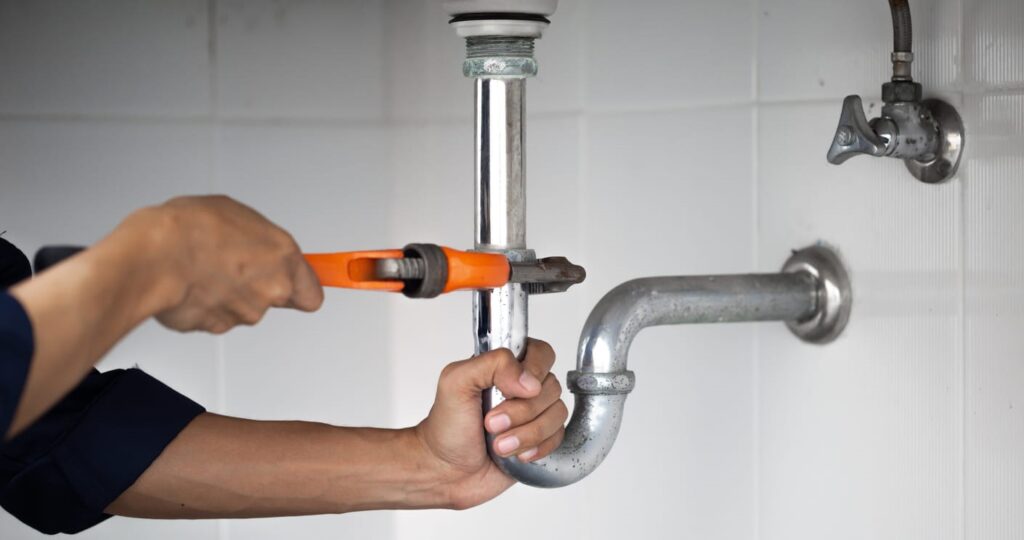
A water leak in your home or office is a serious problem because it increases your water bill without you knowing there is a hidden leak somewhere. You won’t necessarily know you have a leak until you get your water bill and see the usage increase, yet you know you haven’t used more water than in the previous months. To solve the problem, you’ll need a professional plumber specializing in water leak detection. The water leak can lead to the causing of other issues, such as:
- Toxic mold
- Structural damage
- Electrical problems
- Flooding
- Plumbing failure
The sooner the leak is located, the quicker the repairs can begin and save you from further costs and problems. Learn from Larkin Plumbing where these leaks occur and how plumbers use various tools to find the leaks. We have 75 years of experience serving all of Clark County, Nevada, providing water leak detection for both residential and commercial buildings. We are Larkin Plumbing, a premier water leak detection company in Las Vegas.
What are the signs of possible leaks?
Plumbers look for signs of water leaks in a variety of ways. One of the most obvious is a visible water spot that looks like a stain on a wall or ceiling.
- Mold or mildew spots, along with musty odors
- Peeling paint or wallpaper on the drywall or wood
- Running water sounds when nothing is in use
- Dripping faucets in sinks or outside on the hose bib
- Sagging ceilings are very serious and could mean the leak has been there for a while
- Damaged flooring that is warping slowly due to a leak
- Reduced water pressure
Another method to detect a water leak is to check your water meter when no one is home. When you leave home, write down the meter reading and inspect the number when you return. If the meter number has moved at all, you likely have a water leak. Let a plumber know these changes in meter readings to determine how big of a leak it is.
Where do plumbers usually look for leaks?
After carefully inspecting the home or office for suspected leaks, the plumber will narrow their focus to fixtures. These “endpoints” can be toilets, faucets, irrigation systems, valves, or the outdoor pool. The leak could come from the fitting or adaptors connecting pipes and joints. Once the problem area is located, the plumber can perform further tests to pinpoint the leak.
Tip: A simple way to detect a pool leak is to do a bucket test. Simply place a bucket on the step of your pool with equal water levels inside and outside the bucket. Mark the water level. Wait 24-48 hours and see if the water level changes inside or outside the mark. If the water level shows less on the outside, it could mean you have a pool leak. If the levels remain the same but are only slightly lower, it means normal evaporation in the air. A qualified plumber can use further detection methods to find the cause of a pool leak by checking the pump to the lines without digging up the deck.
What do plumbers use to find leaks?
Plumbers have various tools they use to detect water leaks. Using modern methods, they can go underground or between walls without disrupting your home or office structure. Some of those methods include:
- Thermal imaging uses a handheld device to scan for temperature changes in pipes. The temperature doesn’t have to be hot to be detected because thermal imaging can detect even the smallest changes in liquid temperature.
- Acoustic detection requires the plumber to use headphones and a microphone to detect the sound of running water. All leaks produce sound frequencies, with some not being openly audible, which is why a plumber can listen for abnormal noises in the pipes.
- Video plumbing technology efficiently checks buried pipes by using a tiny video camera attached to a flexible fiber optic cable inserted inside pipes. The plumber can watch on a screen from above ground and detect where the leak is.
Tip: A preventive utility tool you can install is a mechanical water leak detection system to measure your home’s water flow. It’s a helpful tool that can shut off the water at its source during freezes or suspected sustained leaks. Monitoring water usage can give you peace of mind, especially when you are away from home, and prevent catastrophic frozen water damage during a winter weather event.
What tools does a plumber need to do a good plumbing job?
In addition to high-tech equipment used to find leaks, a plumber will need specialized tools designed specifically for fixing plumbing problems. A plumber uses pipe wrenches, flaring pliers, pipe vises, pipe cutters, pipe bending machines, thread sealing tape, crimp tools, and many more. You want to leave the repair to a professional who knows what each of these tools is used for rather than you trying to fix a water leak yourself. Leave it to the professionals to get the job done.
Don’t ignore water leaks; hire a professional plumber now
Don’t hesitate to call the services of a water leak detection company who can come and inspect your premises. The longer you wait, the worse the situation could become, even for a small leak, which can add up to thousands of gallons of water. We’ll come out and do a thorough, professional job to find the source of the water leak and suggest how we can fix it. Larkin Plumbing of Las Vegas can handle all of your plumbing problems. Our plumbing technicians are licensed, bonded, and insured. You can depend on them to find the leak in your home or office.
If you suspect you have a leak in your plumbing, contact the leak detection experts at Larkin Plumbing today!
Sources:
Best Plumber Tools List: 27 Must-Have Plumbing Tools. (2023).
Pool leak detection. (2023).


